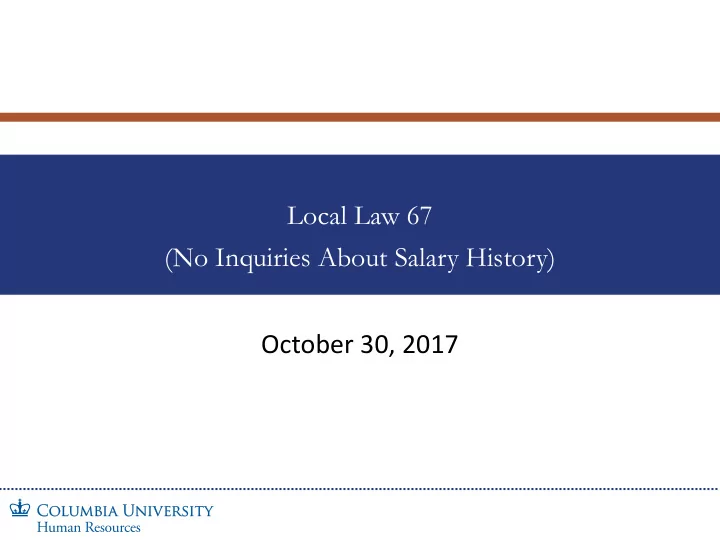

Local Law 67 (No Inquiries About Salary History) October 30, 2017
Local Law 67 The purpose of the law is to address wage inequality for women and people of color by encouraging employers to make compensation decisions based on qualifications and not salary history. The law goes into effect on October 31, 2017 . The law prohibits employers from: – Asking about salary history during the hiring process – Relying on salary history in making salary decisions Note: "Salary history" includes current and prior salary / wages, benefits, and all other forms of compensation 2
How Does the Law Affect Employers? Employers cannot*: Ask about salary history (earnings or benefits) – Cannot ask applicant or ask current / former employer – Cannot make statements intended to solicit the information – Cannot rely on salary history inadvertently disclosed in background check Search publicly available records or reports to learn about salary history Rely on salary history information in making salary, benefits, or other compensation decisions *Unless there is an exception 3
Exceptions Employers can: Make statements about anticipated salary, salary range, bonus, and benefits being offered for a position Inquire about an applicant’s salary expectations or requirements Verify and consider salary history if disclosed by the applicant voluntarily and without prompting (if disclosed during interview you should document the discussion) Consider salary history of current employees applying for internal transfer or promotion Ask about objective measures of productivity at a current or prior job -- such as revenue, sales, or other production reports (Probably N/A at CU: Salary disclosures or verifications specifically authorized under federal, state or local law) 4
What You Cannot Ask How much are you currently making? What is your current salary? What benefits do you receive at your current job? What is your total compensation? How much money did you make at your prior job (s)? 5
What You Can Ask What are your salary expectations /requirements? Do you have any unvested equity or deferred compensation that you would need to forfeit or cancel if you resign from your current role? Best Practice: Preface question with “without disclosing your current salary or salary history…? 6
How to Prepare Review and remove salary history questions from all internal hiring • materials and interview forms Train hiring managers to: • – Focus on candidate’s education, experience, and skills needed for role – Be very conscious about the way in which he/she discusses compensation with their candidates • Focus on what we anticipate or what they expect / require – Document any instance where an applicant “voluntarily and without prompting” discloses salary history – Reach out to third parties such as recruitment and staffing firms so they know not to ask about or send salary history information 7
Consequences Employers, who violate the law, may be subject to: - Damages - Fines - Additional affirmative relief, such as mandated training and posting requirements 8
Key Actions Identify and revise forms and documents Review background check forms and interview materials Remove salary question from JAC application Remove applicant salary history information from JAC application 9
Who to Contact • Academic Personnel – Office of the Dean – Office of Academic Affairs • Administrative Staff – HR Client Manager for your Department 10
Recommend
More recommend